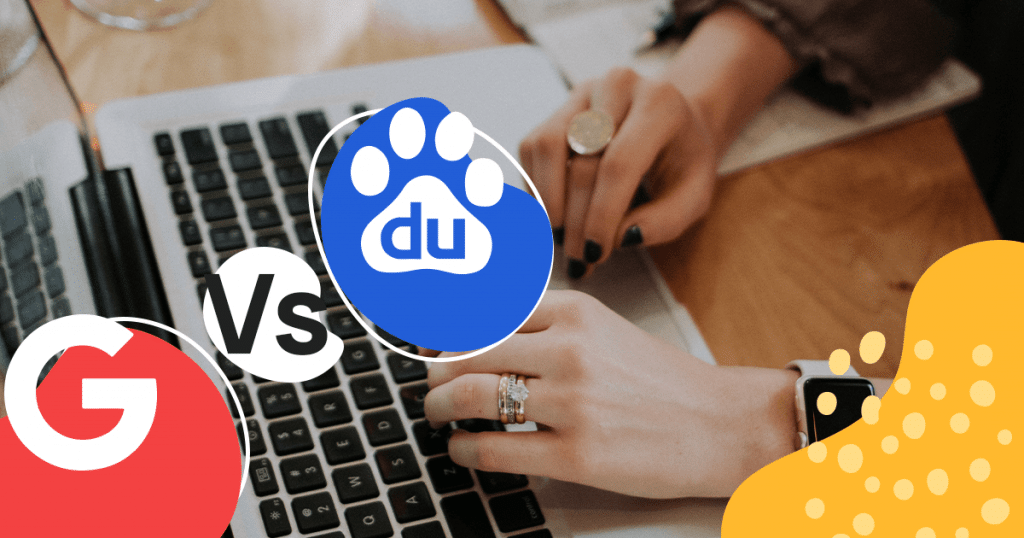When you run your own business, knowing the ins and outs of search engine optimization (SEO) isn’t just a good idea. It’s an absolute must.
Because at the end of the day, you can have the best products and the most compelling content on the entire internet, but it won’t make a difference if no one can find it.
An airtight SEO campaign is your ticket to the type of visibility you need to get ahead.
But it’s important to understand that not all search engines are created equally.
In the United States, Google is still the undisputed search king with over 91 percent of the overall market share. But in China, it’s all about Baidu.
However, while the average American hasn’t even heard of Baidu, it’s the second-largest search engine in the world.
That makes it very relevant to online marketing professionals, and understanding the similarities and differences between the two is critical.
Let’s go over what you need to know about Baidu vs Google.
How Does Google SEO Work?
If you’re focused on dominating the world market, then Google is the name to know when it comes to the search engine game.
It’s quite literally a household name to the point where its name is synonymous with the very act of searching itself.
After all, who hasn’t mentioned Googling something in casual conversation at this point?
Master the fine art of ranking on Google, and it’s just a matter of time before you’ve got your target demographic eating out of your hand.
Here’s a quick rundown of the principles of good Google SEO technique:
- Unique, high-value content that stands apart from everything else out there.
- Skillful, thorough use of relevant keywords that don’t cross the line into keyword abuse or stuffing.
- High-quality links that are not only relevant to the content but support it.
- Fast, user-friendly, organized websites and blogs.
- Timely updates to your website, as well as the frequent addition of fresh, new content.
How Does Baidu SEO Work?
Baidu is known in marketing circles as the Chinese Google, and it’s not hard to see why. It mirrors the search engine the rest of us know so well in so many ways.
Not only is it the go-to search solution in China, but it has the internet covered in a variety of other ways, as well. (Think Google-like offerings like pay-per-click advertising, geo-targeting, and dedicated services for music or video.)
The ability to rank on Baidu is something serious marketers worldwide are becoming increasingly interested in, but Baidu is very different from Google when it comes to SEO.
Here’s a peek at what it takes to rank well on there:
- Content written in the right language, as Baidu favors Chinese to an extensive degree.
- No content that could qualify as censored material, including seemingly innocent words with political significance in Chinese culture.
- Meeting specific certification requirements, as well as having a website optimized with Chinese users in mind.
- If possible, a website domain that is hosted in China.
- Full mobile compatibility, as most Chinese users do their web searching via mobile devices.
- The ability to capture the attention of Chinese internet users and keep them on your website for extended periods.
Is Google Still Banned in China?
China’s internet access is heavily regulated and censored by a series of technologies and legislative measures. These are collectively known as the Great Firewall. That said, Google Search is almost entirely banned in China.
When someone located on the Chinese mainland attempts to access Google Search, they’re immediately redirected to Google’s Hong Kong servers instead.
At that point, searches considered relatively harmless by the Chinese government may yield standard results. However, any searches on (or related to) forbidden keywords (like Dalai Lama or Tiananmen Square) almost always result in error pages instead.
Furthermore, Google’s entire suite of other tools and services is fully blocked in China. Examples include Gmail, YouTube, Play Store, Maps, News, Translate, and Drive.
It is possible to get around China’s Google ban using a VPN network.
However, many VPNs that worked previously are now out of service within Chinese borders altogether, leaving most Chinese searchers out of luck.
Why Does Baidu Lead Google in China?
When it comes to Baidu vs Google, Baidu outstrips Google by a landslide in China to the tune of multiple billions of searches. However, the biggest reason is also one of the most obvious.
Google isn’t accessible in China unless a user has a reliable workaround, so going with Baidu instead just plain makes sense.
You can log right on, perform your searches, and easily get the results you’re after without having to think outside the box too much.
However, Baidu is a lot more than just another search engine. It’s actually a massive China-based tech company that specializes in internet access, cutting-edge AI, and more. It’s also one of the largest, most successful companies of its type in the entire world.
Which Countries Use Baidu?
Since Baidu is a Chinese company and internet services provider, it naturally makes sense that the vast majority of its users are located in China.
As of February 2022, 97.3 percent of Baidu’s total global traffic came from China. (Since China is such a populous country, that traffic is directly responsible for Baidu’s status as the second most popular search engine in the world.)
And although there’s not much of a contest between Baidu vs Google in the United States, Americans can (and sometimes do) access Baidu, especially for digital marketing purposes. They accounted for approximately 0.08 percent of Baidu’s traffic, while another 0.06 percent came from Japan.
However, don’t count Baidu out as a potential global search engine contender just yet.
A powerful focus on factors like mobile accessibility has found Baidu looking to expand into other international markets as well. Think major markets like India, Brazil, and Indonesia!
Which Countries Use Google?
In comparison to Baidu, it goes almost without saying that Google is a worldwide phenomenon when it comes to search engine querying.
As of July 2022, numerous countries reported huge chunks of their collective desktop traffic originating from Google.
India led the pack with 93.99 percent, followed closely by Brazil with 89.11 percent and Italy with 88.54 percent.
Spain, Hong Kong, Australia, Canada, and the United Kingdom weren’t far behind.
Even China (where Google use is almost entirely banned) boasted a modest 8.78 percent.
Other countries that rely at least partially on Google for their search engine needs included France, Germany, the United States, Japan, South Korea, and Russia.
In other words, there’s no real contest between Baidu vs Google when it comes to worldwide dominance. It’s far and wide the leading search engine in many major online markets, and this isn’t likely to change anytime soon.
Google also eclipses not only Baidu when it comes to the sheer extent of its use, but also Yahoo, Bing, Yandex, and others.
What Does It Take to Rank on Google and Baidu?
While there are similarities between Google and Baidu, especially regarding their comprehensive natures and overall reach, they are two very different search engines.
They’re each designed to cater to very different cultures, as well, so you’ll need to tweak your SEO strategy so that it works for both.
Pay attention to your metadata
Metadata is essential on Baidu, just as it is with Google, so be sure yours is fully optimized for relevant keywords.
And be aware that metadata is even more critical when it comes to images.
Google’s image AI is pretty advanced, but Baidu’s doesn’t quite live up to that standard yet. It relies heavily on image metadata and alt text, so you need to master these to rank well in image searches.
Make sure your site is easy to crawl
While Google bots do an outstanding job of crawling JavaScript, Baidu is famously bad at it.
For this reason, you’ll need to use good, old-fashioned HTML to present your most important content, links, and web features.
This goes for both the mobile and standard desktop versions of your website. In addition, good marketing and PR help immensely with getting your site crawled and indexed by Baidu.
Emphasize mobile navigation
The evolution (and overall accessibility) of the internet happened a lot more slowly in China than it did in other parts of the world, so by the time it really hit its stride, so had mobile technology.
For that reason, Chinese internet users are exceptionally comfortable accessing the web via their phones.
Full mobile compatibility is a must, as is the use of popular mobile-friendly payment options like Google Pay and Apple Pay.
Understand the role of social media
Social media plays a vital marketing role in Baidu SEO, just as it does with Google, but there are different platforms to get to know.
WeChat and Sina Weibo are prevalent networks in China, but Baidu-owned platforms (like Zhihu, Tieba, and Douban) should be on your radar, as well.
Establish presences on these platforms with a strong focus on frequent updates consisting of original content and building a large follower base.
Getting verified is a very good idea on these social networks, as well.
Baidu vs Google: Crucial SEO Differences Between the Two
If you’re serious about making Baidu a big part of your digital marketing plan going forward, you’ll want to develop a complete understanding of how the two do things differently when it comes to SEO and assigning rankings to a particular site.
The following are among the most crucial points to remember.
1. Focus and Demographic
If you ever feel like Google dominates what practically amounts to the whole world, know that that’s no accident.
Google is all about cornering the worldwide market.
Baidu, on the other hand, is really only focused on China.
It currently has over 70% of the Chinese market, so it’s a must-know for marketers looking to expand into Chinese demographics.
2. Favored Language and Cultural Demographic
Since Baidu caters primarily to the needs of Chinese users, it should make sense that they also strongly favor websites and content in Mandarin Chinese.
Baidu SEO technique not only requires a grasp of Chinese but a thorough understanding of the simplified Chinese characters it prefers. (Automated translations are a definite no-no.)
Baidu will also favor Chinese websites, products, and services, while Google is relatively impartial about how it displays search results.
Baidu is especially partial to its own sites, such as Baidu Wiki, Baidu Library, and Baidu Knows. It also prioritizes websites hosted in China or Hong Kong.
3. Search Layouts
You may be familiar with the relatively straightforward way Google ranks its paid search results, as well as with the fact that paid results predictably appear together in blocks at the top or bottom of each SERP.
Baidu tends to mix its paid results right in with everything else, but they do allow individual brands to pay for a spot at the very top. (This is known as the Baidu Brand Zone.)
Paid ads are also considered more important than organic results.
4. Link Building Strategy
Both Google and Baidu consider backlinks to be essential when it comes to SEO.
Both also consider both the quality of a site’s links, as well as how many it has to its credit.
However, Baidu has an approach that differs in the following ways:
- Measuring link relevance against both variety and quantity.
- Heavy emphasis on anchor text, especially regarding the variety.
- High priority placed on Chinese backlinks.
- Preference for links on high-level pages over deeper pages, especially those with lots of content.
5. Preferred Content Types
Many digital marketers in the Western world believe Google favors content on topics like tech.
However, Baidu tends to prefer other subjects. Examples include lifestyle, travel, music, games, and entertainment.
For best results, consider these preferences when putting together a Baidu-focused SEO strategy.
6. ICP Licenses
Anyone who knows what they’re doing can purchase a domain and set up a website that gets indexed and ranked by Google.
However, you will need to obtain an Internet Content Provider (ICP) license from the Chinese government before you can activate a Chinese domain you may have purchased.
To accomplish this, you will also need either a registered Chinese business or another recognized foreign business license.
An ICP license is also required to run paid business ads through Baidu.
7. Censorship Concerns
Unless you’re talking about content that’s completely illegal, Google doesn’t censor much when it comes to its search results.
On the other hand, Baidu adheres stringently to the Chinese government’s censorship rules, so it will only index sites that do the same.
That said, you’ll need to make sure your website steers clear of pornography, gambling content, or anything that disagrees with Chinese government views.
You will also need to learn and avoid a running list of specific prohibited Chinese characters and words.
Wrap Up: Craft an SEO Strategy That Gets You Ahead
Now that you know about Baidu vs Google (and what it really takes to rank not only on Google but on the second most important key player in the search engine game), it’s time to take the next step.
Our comprehensive search engine optimization guide helps you fortify your strategy effectively and take it to the next level, whether you’re starting a new campaign or revamping an old one.
Get your copy today!

![[WA] Ultimate Content Marketing Kit](https://rockcontent.com/wp-content/uploads/2022/08/Content-Marketing-Kit-750x200px.jpg)
![[Rock NA] State of Marketing Reports 2024 – Comkt Hubspot State of Marketing Report 2024](https://rockcontent.com/wp-content/uploads/2022/07/Banner-Fino-Rock-Convert-2500-%C3%97-500-px-19.png)








